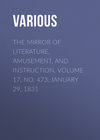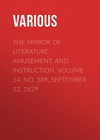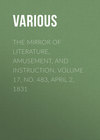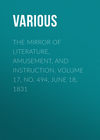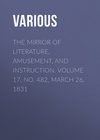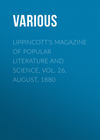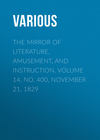Czytaj książkę: «The Mirror of Literature, Amusement, and Instruction. Volume 17, No. 473, January 29, 1831», strona 2
ORIGIN OF THE ENGLISH TITLE "DUKE OF CLARENCE."
(To the Editor.)
In No. 437 of the Mirror, is an account of "Clarence and its Royal Dukes, " which seems to imply that the title is derived from a town in Suffolk; but according to a recent traveller, the origin is of much older date, having descended by marriage, from the Latin conquerors of Greece. He thus describes the ancient town of Clarentza:—"One of the most prominent objects was Castel Tornese, an old Venetian fort, now a ruin, but in former days affording protection to the town of Chiarenza, or Clarentza, which, by a strange decree of fortune, has given the title of Clarence to our Royal Family. It would appear that at the time when the Latin conquerors of Constantinople divided the Western Empire amongst their leading chieftains, Clarentza, with the district around it, and which comprised almost all of ancient Elis, was formed into a Duchy, and fell to the lot of one of the victorious nobles, who transmitted the title and dukedom to his descendants, until the male line failed, and the heiress of Clarence married into the Hainault family. By this union, Phillippa, the consort of Edward III. became the representative of the Dukes of Clarence; and on this account was Prince Lionel invested with the title, which has since remained in our Royal Family. It is certainly singular that a wretched village in Greece should have bestowed its name upon the British monarch." According to the above account, Clarentia, I should suppose, is a corruption of Clarentza, and, perhaps, took its name in honour of the son of the warlike Edward; but, as to a "wretched village in Greece," bestowing its name upon the British monarch, the writer must be aware, according to his own account, that in ancient times Clarentza was no more a poor village, than Clare is what it was, when the wassail bowl cheered the baronial hall of its now mouldering castle.
W.G.C.
YES, WE SHALL MEET AGAIN
(For the Mirror.)
"The grave is the ordeal of true affection."
Washington Irving.
Yes, we shall meet again,
When this world's strife is over;
And where comes not care or pain,
A brighter land discover.
I will not think, in lasting night,
Earth's love and friendship dies;—
It lives again, serenely bright,
In worlds beyond the skies.
I will not think the grave hath power
To dim this heart's undying love;—
Oh! may I still, in death's dark hour,
Its lasting fondness prove.
Immortal sure some feelings are;—
Oh! not of earth the pure devotion,
Which lives in one fond earthly care,
And that—pure Friendship's soft emotion.
For brightest this wild world appears
When far each selfish care is driven;
Soft Pity! dry not yet thy tears—
They make dark earth resemble heaven.
For other's weal, for other's woe,
Let me have smiles and tears to give;
And all my busy care bestow,
In some fond trusting heart to live.
And let a voice be murmuring near,
When other sounds are faint and low.
And whisper softly in my ear.
When Death's chill dews are on my ear—
"Yes, we shall meet again,
When this world's strife is over;
And, where comes not care or pain,
A better land discover."
Kirton Lindsey.
ANNE R.
WHO WAS KATERFELTO?
(To the Editor.)
Perhaps some of your curious readers would oblige me with a little information concerning the personage mentioned in these lines of Cowper:—
"And Katerfelto, with his hair on end,
At his own wonders wondering for his bread,"
Task—Winter Evening.
All that I could discover about him, I found accidentally in a pamphlet on Quackery, published in 1805, at Kingston-upon-Hull. In a note to that little work, I am informed that Dr. Katerfelto practised on the people of London in the influenza of 1782; that he added to his nostrum the fascinations of hocus pocus; and that among other philosophical apparatus, he employed the services of some extraordinary black cats, with which he astonished the ignorant, and confounded the vulgar. But he was not, it seems, so successful in his practice when out of London: not long before his death, he was committed by the Mayor of Shrewsbury to the common House of Correction in that town, as a vagrant and impostor. When or how he died does not appear.
Cowper, when he mentions the name of Katerfelto, in the Task, in alluding to the advertisements of the London newspapers—and probably wrote the passage in the year 1782. The Task was published complete in 1785.
Whoever has easy access to the newspapers of 1782 or thereabout (as I, at this moment have not) will most probably discover some amusing particulars about this Doctor, that may attract your readers, few of whom will be more gratified than
Great Russell-st.
W.C.
THE CHEROOT
(To the Editor.)
In page 429, vol. xvi. of your amusing Miscellany, the Cheroot is called a China Cigar. The writer, if he had given himself the trouble to inquire of any person who had ever been in that country, would have ascertained that there is no such thing as a Cheroot manufactured in China; and what are called Cigars there are nothing more than a small quantity of very fine cut yellowish tobacco, wrapped up in white paper, and about two inches or rather more in length. These, the Chinese sometimes smoke, but generally prefer a shallow cupped pipe of composition metal, of which copper is the principal part; to which a long whanghee or small black bamboo is attached, as a stem or stalk, sometimes more than a yard in length, and tipped with an ivory tube or mouthpiece. They generally carry a piece of joss-stick or slow-match with them, and a flint, steel, and punk; and when they are inclined to smoke, they strike fire on apiece of punk, and light the joss-stick, which will continue burning a long while. As their tobacco is very fine and dry, the pipeful seldom takes more than one or two whiffs to consume it, and they emit the smoke through their nostrils in large volumes. In this manner they will smoke more than a dozen pipesfull in a short time. Cigars are generally imported into China by the Americans, or sent from Manilla; and Cheroots by the English and other trading vessels from Bengal or from Madras.
In India, the lower orders use a hookah or hubble bubble, which is made of a cocoa-nut shell well cleaned out, having a hole through the soft eye of the shell, and another on the opposite side, a little lower down, the first of which is used for the chauffoir, and the other to suck or draw the smoke from. The shell is nearly filled with water, and a composition of tobacco, sugar, and sometimes a little opium, is put into the chauffoir, in shape of a ball, about the size of a marble, which they call joggery. A live coal is then put on the ball in the chauffoir, and the hubble-bubble is handed from one to another, with the best relish imaginable. Sometimes a dozen natives, get squatting on their hams, in a group, and pass this delicate article of luxury from one to another, each taking two or three good pulls at it as it goes round, and chattering three or four at a time, like so many apes. They likewise emit the smoke through their nostrils like the Chinese. The women are in the habit of enjoying the hubble-bubble, in groups, in a similar manner.
The best Cheroots are manufactured at Chiusmab, near Calcutta, where likewise a great quantity are made up; they vary in length from four to eight or nine inches. A great quantity are likewise manufactured at Masulapatam, but they are considered as much inferior to those of Bengal. At Masulapatam there is a very extensive manufactory of a black clammy snuff, which is sent all over Hindostan.
Camden Town.
R.L.
STORY OF A BOY
(For the Mirror.)
Some years back a small party of children were amusing themselves upon the beach, near the town of Conway, in North Wales. One of them a fine boy of three years old being much fatigued, left his juvenile companions, and unperceived by them, got into a boat not far from the spot, and fell asleep. The tide soon afterwards coming in, floated the boat, and carried it up the river; and upon the return of tide it fell back, and subsequently the boat and infant were carried out into the channel, between Puffin Isle, near the Anglesea Coast and the Lancashire Shore, or I should say, in the Irish Channel. A trading vessel, in the grey of the morning, perceiving a small boat so far from any land, bore down, and the crew to their great surprise, found only the poor child in it, nearly heart broken at its unfortunate situation, and totally unable to give any regular account of itself. The master of the vessel felt every wish and anxiety to restore the poor child to its parents, but not being able to glean from it who they were, and having no children of his own, he made up his mind to adopt the boy, congratulating himself that Providence had in this singular manner thought proper to send him an heir to his property, and a delight as he fondly hoped in his declining years. Accordingly after his return back from Liverpool, where he was then bound, to his residence in the North of Ireland, he introduced his little charge to his wife, who had never borne him any family; related the very singular manner he had found him, and they mutually agreed to take him under their protection until they could find out his parents, and if they were unsuccessful, to bring him up as their own child.
Sometime afterwards the mother of the boy came to be made acquainted with what had happened to him, and she caused a letter to be sent to his foster father, wishing her child to be given up to her; her application was attended to, expressing much pleasure at being able to restore the boy to her, but stated that he was doing well, and in good hands, they were reluctant to part with him; and to induce his mother to suffer him to remain where he was, she was informed that his protector had made his will, and upon his demise, had left the whole of his property to the child. All this had no weight, she demanded her son, and the little fellow was afterwards given up, with many tears and regrets by his foster parents, to his mother, at Liverpool. It would be well could the narrative break off here in the manner it could be wished. But soon afterwards, upon the return of the boy with his mother to their home, playing with some children in the neighbourhood of Oakland Carding Manufactory, near Llanurst, he unfortunately fell into a small sheet of water and was drowned before any assistance could be rendered him.
Paddington.
J.N.J.
